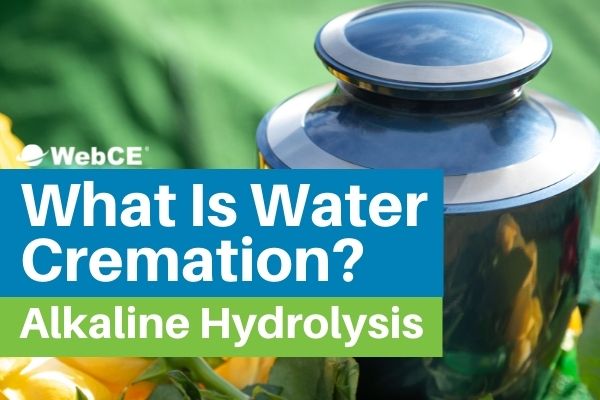
Water cremation, a process technically known as alkaline hydrolysis, is one of the newest trends in cremation and deathcare. Water cremation is a safe, environmentally friendly alternative to traditional heat cremation. It is becoming increasingly popular in the United States as states and regulators continue to approve the process.
Water cremation is also sometimes called aquamation, biocremation, flameless cremation, chemical cremation, liquid cremation, and others. Legally, states and regulators use the following terms for the method: cremation, dissolution, chemical disposition, and alkaline hydrolysis (AH).
What is Water Cremation?
Alkaline hydrolysis uses techniques to decompose a body in the same way that it naturally decomposes after burial. This process is sped up dramatically using alkaline chemicals, water, heat, and sometimes pressure, which in turn accelerates the body’s natural decomposition.
Once the process is complete, no tissue or DNA remain in the liquid. The only remains in the chamber are bones and the sterile liquid solution.
How Does Water Cremation Work?
The deceased’s remains are placed inside a water- and airtight chamber containing a mixture of water and alkaline chemicals. The process can take anywhere from three to 18 hours, depending on the deceased’s mass and weight and the funeral professional’s technique and equipment. Cremationists typically use either potassium hydroxide (KOH) or sodium hydroxide (NaOH), or a combination of the two, as their alkaline agents.
After the process is complete, all that remains are bone fragments and a sterile liquid solution containing no body tissue or DNA. The bone fragments are dried and then pulverized. Water cremation results in around a third more cremated remains than traditional cremation, so it sometimes requires larger urns.
Is Water Cremation Legal?
Water cremation is legal in about half of the United States. Regulators have approved and accepted alkaline hydrolysis in the following states:
- Alabama
- California
- Colorado
- Connecticut
- Florida
- Georgia
- Kansas
- Idaho
- Illinois
- Maine
- Maryland
- Minnesota
- Missouri
- Nevada
- North Carolina
- Oregon
- Utah
- Vermont
- Washington
Texas is also currently considering allowing alkaline hydrolysis as a legal form of cremation.
Water Cremation and the Environment
While flames from traditional cremation allow toxins and some of the deceased’s remains to float into the air as the tissue decomposes and evaporates, the water cremation process dissolves tissues and bone while the excess fluid drains into the black wastewater treatment system. But is chemical treatment more “green” than traditional cremation?
Water cremation is considered significantly more eco-friendly than heat cremation. Alkaline hydrolysis uses about 90% less energy compared to traditional cremation processes. Without flames, alkaline hydrolysis also releases no toxic emissions into the air.
Who Chooses Water Cremation?
Water cremation may be the answer for some families who are timid about subjecting family members to incineration and who are interested in preserving the environment. This form of cremation is also being embraced by younger families who have an aversion to the concept of bodies decomposing in the ground, whether rapidly or slowly as a result of embalming.
Learn Cremation Best Practices
If you are a funeral professional looking to learn more about cremation best practices, WebCE has you covered! Cremation has become the preferred choice today for many individuals, and the cremation rate is expected to continue increasing in the coming decades. It's important for funeral professionals to understand the practical side of cremation as well as how to become more involved in providing meaningful experiences for families.
To learn more, you can order our Funeral CE course Cremation Best Practices. This course introduces funeral professionals to the practical and technical aspects of cremation and explains why cremation has become an increasingly popular option today. Funeral professionals will also learn key terminology relating to cremation as well as the technical aspects of the cremation process.
The course also explains strategies that funeral directors can use to enhance customer service and make for a more positive memorial experience. Finally, the course addresses new and emerging trends in cremation practices, including water cremation!